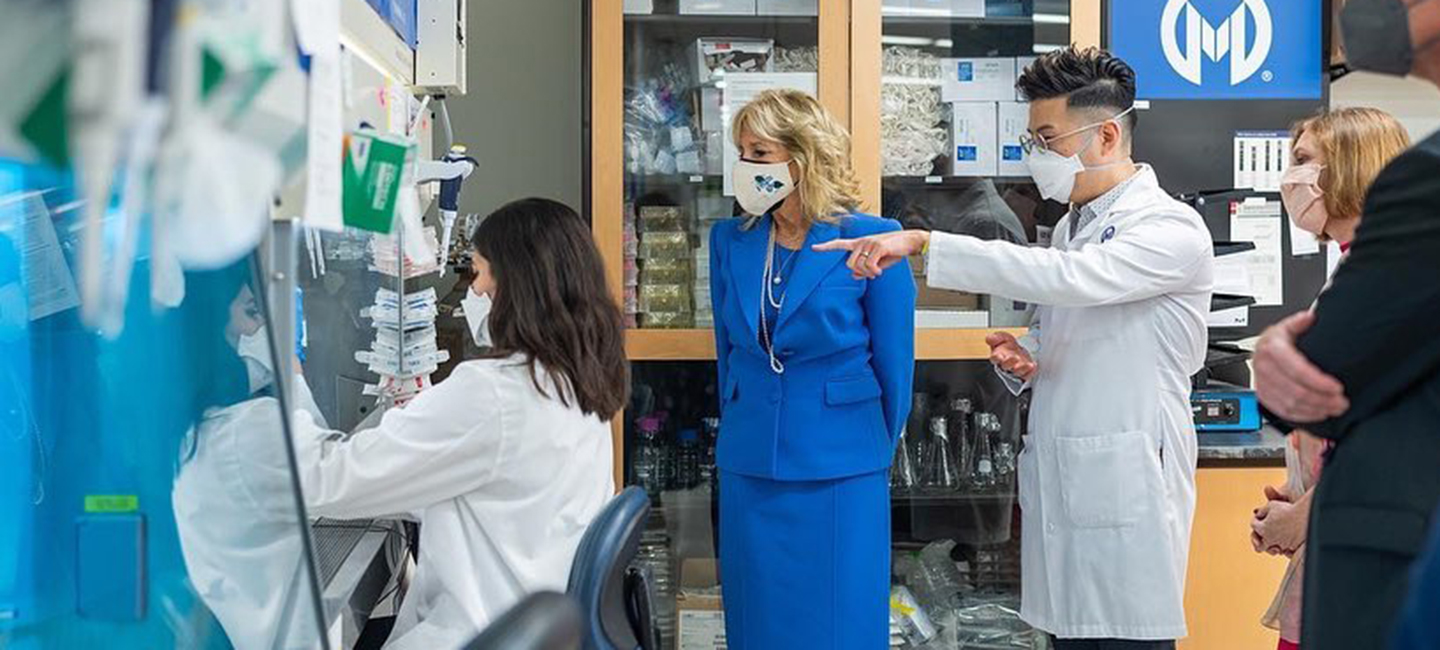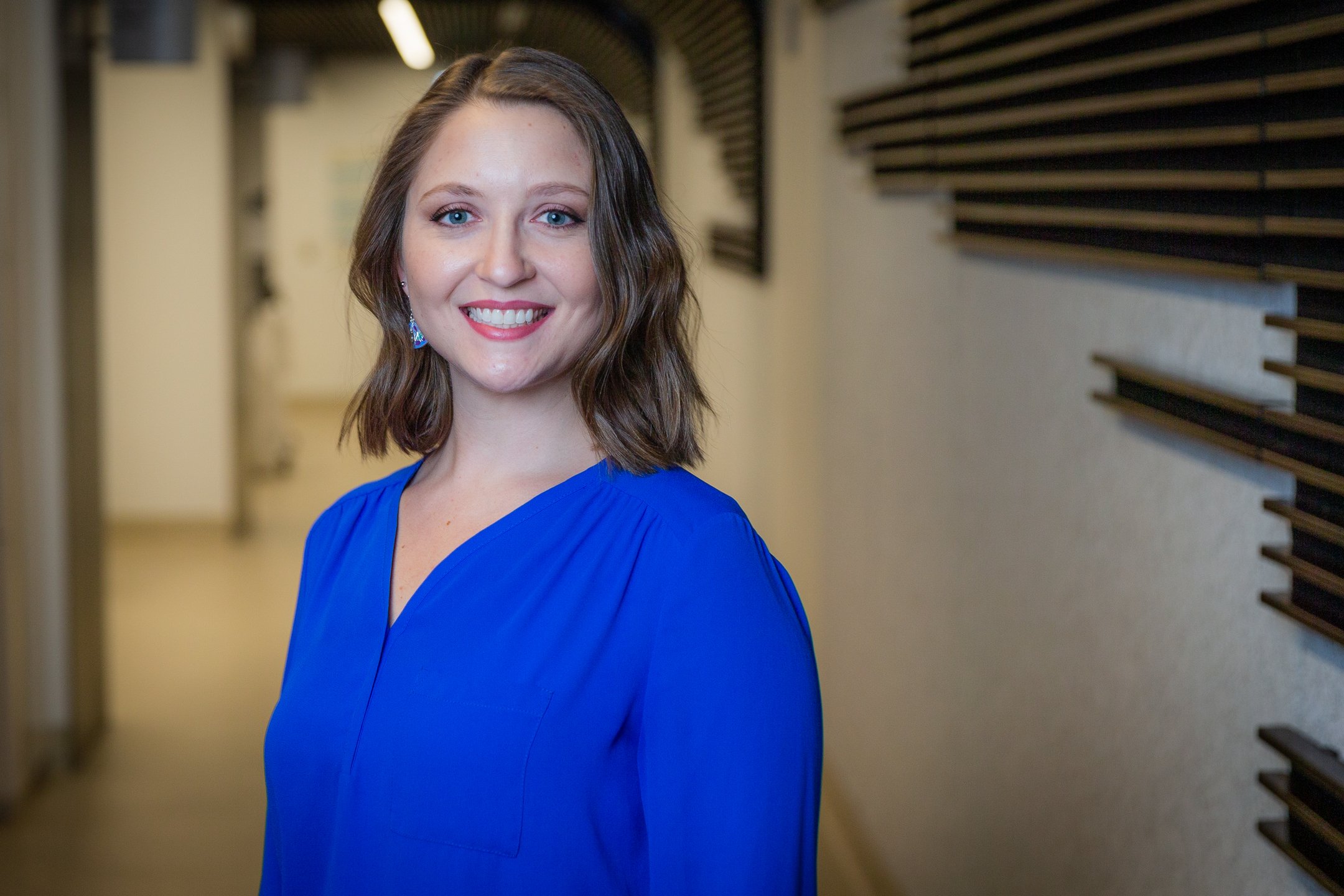First Lady Visits Moffitt Cancer Center Following Moonshot Relaunch
First lady Dr. Jill Biden toured Moffitt Cancer Center on Friday with National Cancer Institute Director Dr. Ned Sharpless and U.S. Rep. Kathy Castor. The visit comes on the heels of President Joe Biden’s pledge to “end cancer as we know it” through the newly revitalized White House Cancer Moonshot program. The initiative first launched in 2016 during Biden’s vice presidency. It aims to accelerate the progress of cancer research in the United States.
“A great way to kick off the supercharged Moonshot,” said Sharpless. “The president is committed to ending cancer as we know it, and what does that mean? We have to figure that out and how we work with partners like Moffitt Cancer Center to make that happen.”
Cancer centers across the country have been called to action to improve screenings and bring bold ideas to the table. Moffitt is at the forefront of screening and prevention.
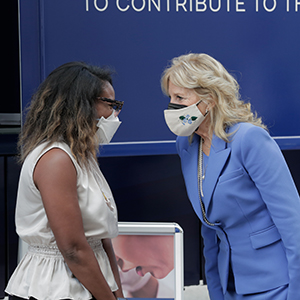
Melanoma survivor and advocate Jackie Smith discusses sun safety with the first lady.
During her visit, the first lady met with researchers, doctors, nurses and patients to learn how Moffitt is ahead of the curve in contributing toward two new national goals set forth by the president: to improve the experience of people and their families living with and surviving cancer, and to reduce cancer deaths by at least 50% over the next 25 years.
“This hospital is doing such an amazing job,” she said. “Joe and I are continuing our work in cancer. As you know, early detection is the key. Because of the pandemic, so many people have put off their cancer screenings, so I’m going to be out traveling trying to get people to get back to screenings.”
Patient Researcher Forum a New Model
President and CEO Dr. Patrick Hwu, Center Director Dr. John Cleveland and founder H. Lee Moffitt welcomed the first lady to the cancer center. She began her tour visiting the lab of researcher Dr. Eric Lau, an assistant member of the Department of Tumor Biology, where she learned about Moffitt’s Patient Researcher Forum. Co-founded by Lau in 2018, the forum is a novel patient engagement and education program that connects patients and caregivers with the researchers working behind the scenes of their specific cancer.
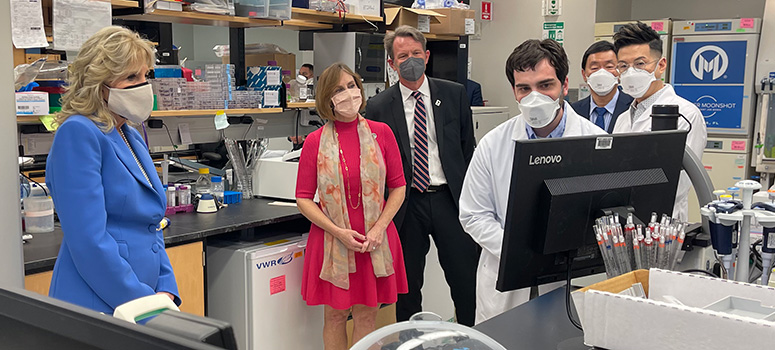
From left, first lady Dr. Jill Biden, U.S. Rep. Kathy Castor, NCI Director Dr. Ned Sharpless, cancer biology and research student Chase Burton, Dr. Patrick Hwu and Dr. Eric Lau tour the Lau lab.
“Our goal is to give patients and caregivers a firsthand look into the current state of cutting-edge cancer research and to expose research trainees to a patient’s personal cancer journey,” said Lau. “This intimate forum with patients helps to stimulate ideas of potentially new research directions based on patient needs while promoting compassion-fueled research.”
Stephanie Streed, a nurse navigator in Moffitt’s Breast Oncology Program, and Patti Halula, a metastatic breast cancer patient, also participated in the mini forum. Care coordination is critical given the options that patients face in selecting treatment and participating in clinical trials. To address this need, Moffitt implemented a nurse navigator model to provide support for patients throughout their cancer journey based upon their specific diagnosis and associated challenges.
At the relaunch of the Cancer Moonshot program, the president emphasized an urgency to make cancer prevention a reality while sharing that more than 9.5 million Americans missed cancer screenings during the pandemic.
Moffitt recognizes the need for early intervention and has provided free skin cancer screenings and education to communities throughout Florida for nearly three decades with the Mole Patrol screening unit.
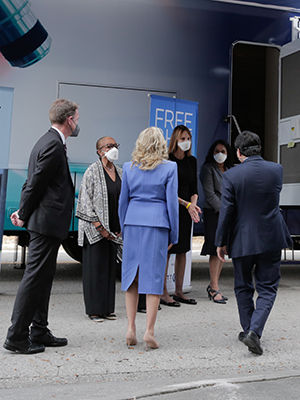
The first lady visits the Mole Patrol, Moffitt's state-of-the-art mobile screening unit.
The first lady toured the state-of-the-art mobile unit while speaking with Dr. Susan Vadaparampil, associate center director of Community Outreach, Engagement and Equity, and Dr. Jane Messina, vice chair of Anatomic Pathology, about the importance of reaching people and being present in diverse communities, especially those at higher risk for skin cancer.
“This center has been leading the charge in terms of cancer prevention for a number of years,” said Vadaparampil. “We’re actually providing ideas about how the rest of the country needs to do it. Moonshot 2.0 is an opportunity for us to really accelerate and even move further ahead of the pack.”
The first lady also met melanoma survivor and patient advocate Jackie Smith, who underwent a clinical trial at Moffitt to save her life after a lump in her groin was overlooked for years. Smith, a Black woman, now advocates for the importance of skin screenings, especially for people of color. For many of the most common types of cancer, incidence and/or death rates are higher among Black people than other racial and ethnic groups.
Extending Our Reach into the Community
Addressing these kinds of disparities and health inequities is a top priority for Moffitt’s Department of Health Outcomes and Behavior. Led by senior members Dr. Clement Gwede and Dr. Cathy Meade, this team is focused on reenergizing the community to prioritize cancer screenings following the decline during the pandemic. One of these areas is colorectal screenings.
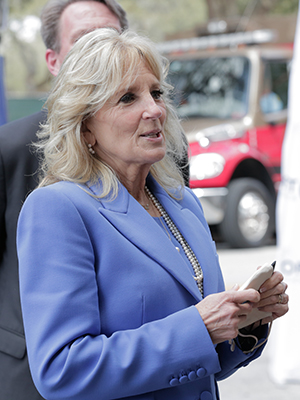
The first lady discusses the importance of reenergizing cancer screenings and community engagement with Moffitt's top experts.
Gwede and Meade emphasized how colorectal cancer is increasing in younger age groups and represents a substantial area of cancer disparity in the Black community. Moffitt has been collaborating with trusted community partners, like Suncoast Community Health Centers, for more than 20 years on numerous research and outreach activities dedicated to developing culturally appropriate strategies to reach those in greatest need.
Faculty members from Moffitt’s Department of Integrated Mathematical Oncology also met the first lady. Within this team are biologists, physicists, mathematicians and computer modelers that collaborate with Moffitt physicians and scientists to answer some of cancer’s biggest questions. It’s the first collaboration of its kind in the world that uses math combined with an integrated approach of theory and experiments to identify ways to treat cancer as a chronic disease.
Dr. Sandy Anderson, Dr. Joel Brown, Dr. Heiko Enderling, Dr. Bob Gatenby and Dr. Katarzyna Rejniak are raising the next generation of mathematicians and motivating potential aspiring scientists through an eight-week mathematical oncology internship program for high school students. The group also has a unique partnership with Dartmouth University where students majoring in math can spend a semester at Moffitt working with an IMO mentor to conduct their own research.
Dr. Biden's visit is really inspirational,’ said Dr. Cleveland. “This is a terrific honor and highlights the importance of the work we’re doing at Moffitt and in the community. In 35 years, we’ve become a remarkable center and it’s really showing in the superior outcomes for the patients we treat. We are very responsive to this mission to prevent cancer and improve screenings.”
Since losing their son Beau to brain cancer in 2015, the Bidens have championed a national commitment to cancer research and prevention. The first lady has made cancer a priority initiative aiming to “work on behalf of American families confronting cancer, focusing on supporting cancer patients and their loved ones; urging Americans to prioritize their cancer screenings; and reducing health inequities.”
MORE COVERAGE: Here’s the Moffitt team that met with Dr. Jill Biden


